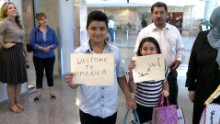Story highlights
- According to court papers, both men legally were allowed to come into the US
- Lawyers for the Iraqis are aiming to file a class-action lawsuit on behalf of other refugees
Does the travel ban affect you, your friends or loved ones? We want to hear your stories. Tag #CNNiReport on social or use WhatsApp +44 7435 939 154 to share stories.
Washington (CNN)Lawyers for two Iraqis who had been granted visas to enter the US have filed a lawsuit against President Donald Trump and the US government after they were detained when they arrived in New York Friday.
The lawsuit could represent the first legal challenge to Trump's controversial executive order, which indefinitely suspends admissions for Syrian refugees and limits the flow of other refugees into the United States by instituting what the President has called "extreme vetting" of immigrants.
Trump's order also said Iraqi citizens, as well as people from six other Muslim-majority nations, cannot enter the US for 90 days, and suspends the US Refugee Admissions Program for 120 days until it is reinstated "only for nationals of countries for whom" members of Trump's Cabinet deem can be properly vetted.
According to court papers, both men legally were allowed to come into the US but were detained in accordance with Trump's move to ban travel from several Muslim-majority nations.
The lawyers for the two men called for a hearing because they maintain the detention of people with valid visas is illegal.
"Because the executive order is unlawful as applied to petitioners, their continued detention based solely on the executive order violates their Fifth Amendment procedural and substantive due process rights," the lawyers argue in court papers.
The two Iraqi men named as plaintiffs in the suit are Hameed Khalid Darweesh and Haider Sameer Abdulkaleq Alshawi. The suit said Darweesh held a special immigrant visa, which he was granted the day of Trump's inauguration, after working with the US government in Iraq for 10 years following the beginning of the US war in Iraq.
The lawsuit said the US granted Alshawi a visa earlier this month to meet with his wife and son, whom the US already granted refugee status for their association with the US military.
Court papers said Customs and Border Protection authorities did not allow the lawyers to meet with the men and told them to try reaching Trump.
"When Mr. Darweesh's attorneys approached CBP requesting to speak with Mr. Darweesh, CBP indicated that they were not the ones to talk to about seeing their client. When the attorneys asked, 'Who is the person to talk to?' the CBP agents responded, 'Mr. President. Call Mr. Trump,'" the court papers read.
Lawyers for Iraqi refugees filed the suit in federal court arguing Darweesh and Alshawi were being unlawfully held "solely pursuant" to an executive order issued on January 27, 2017.
Arguing that their clients have "valid entry documents," they say the were blocked from exiting John F. Kennedy International Airport and detained.
The lawsuit was earlier reported by The New York Times.
Immigration-rights groups, including the National Immigration Law Center and the ACLU, are representing the Iraqi men. Lawyers for the Iraqis are aiming to file a class-action lawsuit on behalf of other refugees.
"Our courageous plaintiff and countless others risked their lives helping U.S. service members in Iraq. Trump's order puts those who have helped us in harm's way by denying them the safe harbor they have been promised in the United States," said Karen Tumlin, the legal director of the NILC.
An administration official told CNN if a person has a valid visa to enter the US but is a citizen of one of the seven countries under the temporary travel ban, then the person cannot come into the US. If the person landed after the order was signed Friday afternoon, then the person would be detained and put back on a flight to their country of citizenship.
Separately, Department of Homeland Security officials acknowledged people who were in the air would be detained upon arrival and put back on a plane to their home country. An official was not able to provide numbers of how many have already been detained.






















